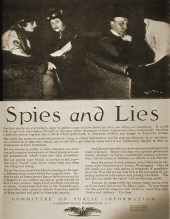
As highlighted in Stuart Ewen’s book,
PR!: A Social History of Spin, AT&T was a clear-cut pioneer in the “public relations” aspect of business. Formerly, the “Robber Barons,” which consisted of industries such as “finance, transportation, capital-goods production, coal, and petroleum,” (pp.100, Ewen), were not in need of a public relations strategy in order to accomplish their greed-drenched goals. Yet, AT&T was truly in a league of its own, as its sights were set on the horizon of a new and modern idea of social life and a new form of communication, in addition to a new way to set forth a monopoly.
This company saw no other destination than being the one and only nationwide telephone service provider. The big difference however, was the fact that AT&T required the “public’s” or “middle-class’s’” approval and funding to grow into the super-power that it desired to be. Therefore, the concept that the middle-class lived in fear of the most: a continuous stream of corporate-takeovers and loss of governance due to monopolies, had to be reshaped to favor AT&T’s business.
Some of the ways that this molding of the American consumers' minds was eventually accomplished, was through the leadership of Theodore Newton Vail beginning in 1907, and as is quoted by Ewen on pp. 93 was through, “cut-rate local phone bills, the friendly greetings of Ma Bell, employee spirit de corps programs and presenting things through the public’s eyes.”
It was with AT&T that for the first time the public was being sought out by a soon-to-be corporate-giant and convinced through ads, that the company was the only solution imaginable to fit nicely into their lives and ultimately, transform their lives . Ewen demonstrated this mass manipulation of the "public" led by Vail, which was mainly a result of the use of such ad's, by bringing it to light on page 94 of
PR!: A Social History of Spin:
“Every Bell Telephone would be the Center of the Bell System,” and this “encouraged telephone users to view the company not as a dark monopolistic leviathan, but as a beneficent mother figure who would make each and every one of them the center of her attentions.”
As localized telephone companies were still being newly-grasped by the public and seemed innovative as it was, AT&T’s emergence was, an idea that was ground-breaking or even unrealistic to most of the “public” during that era. However, through AT&T’s tremendous public relations outreach, the “public” had come to fall into the corporate-fed message that if they bought the telephone service, they would actually be purchasing a “dream.” The advanced methodology of and connections created by AT&T. as advertised and editorialized, was eventually proven to be the revolutionary cornerstone of the middle-class’s community, that was missing all along. Yet, for the “public” to understand that they were lacking something that would be life changing and “necessary,” advertisements had to and did illustrate the future of Americans with AT&T’s phone system already incorporated into their daily living, in order to paint the picture that we now faithfully encourage and embrace in our capitalistic society: “I want that product…No, I actually need it…As a matter of fact, I can’t live without it.”






 "
"




